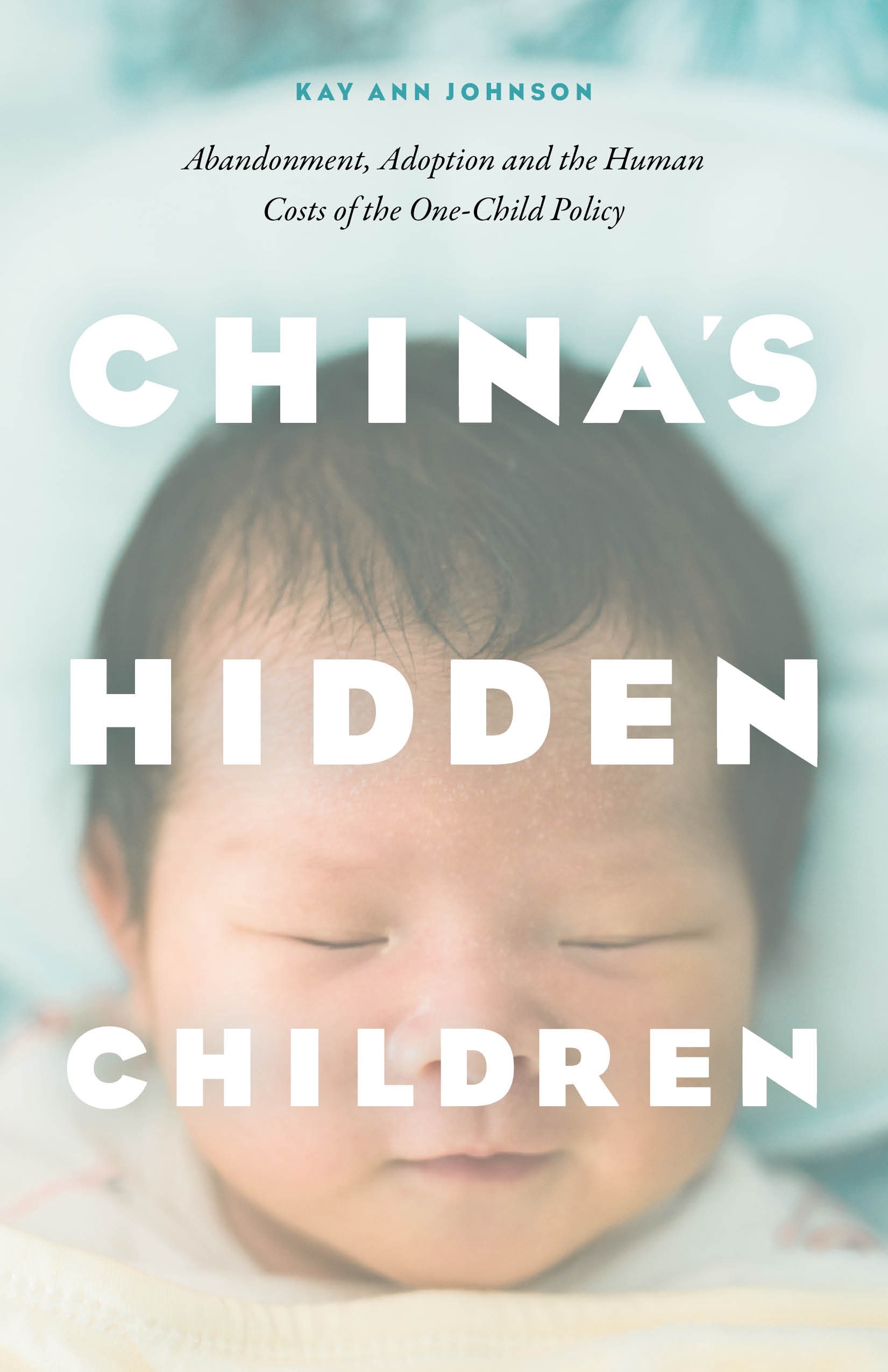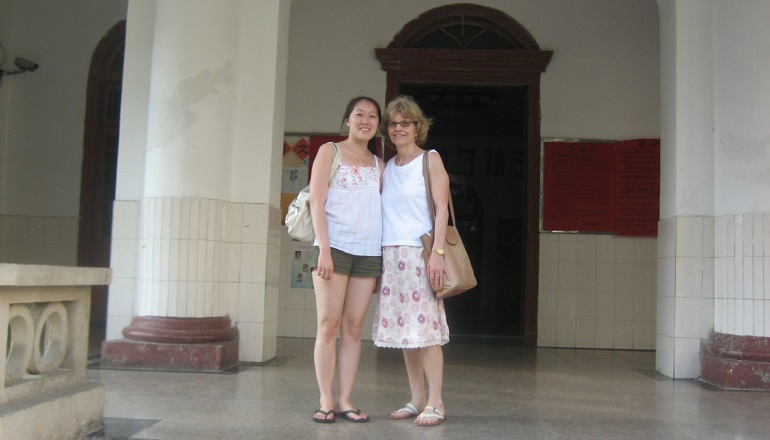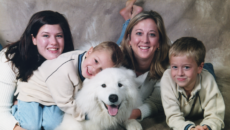Jenna Cook’s poignant article “A ‘Lost’ Daughter Speaks, and All of China Listens,” describes her search for her birth parents in Wuhan, China, where she was left as an infant in March, 1992. In response to local publicity, dozens of birth parents quickly came forward, hoping that she was indeed their “lost daughter.” Sadly, none of the many parents who emerged were Jenna’s birth parents.
Indeed, finding birth parents in Wuhan from this period is truly like finding the proverbial needle in a haystack. In the early 1990s, Wuhan, a large industrial city in central China, witnessed waves of infant abandonment in the wake of fearful, often violent, birth planning campaigns that raged in the surrounding countryside of Hubei Province. These campaigns brought threats of forced sterilization, coerced late abortions, and ruinous fines that impoverished already-poor villagers who were caught with over quota births. Thus, every month, hundreds of children were brought into Wuhan and left in a busy market, at the gates of a police station, on the doorstep of prospective adopters — all places where desperate parents hoped their child would be found and picked up quickly.
Jenna describes the experience of meeting these birth parents as excruciating, having to absorb their grief and tears while bearing her own pain, a pain emanating from a deep “hole in her heart” that she has carried since a young child. While the Chinese press portrayed her as a “lucky” adoptee in a rich country who became a Yale student, Jenna asserts this characterization “obscured the fact that Chinese adoptees, as a population, are also quite unlucky. Although we gained new families, we lost our original culture, language, and citizenship rights. Many of us confronted racism in home communities where there were few other people of color. Every year there are cases of suicide that shake our community.”
There is buried pain on both sides of these adoptions, both sides of the Pacific Ocean.
My recently published book, China’s Hidden Children: Adoption, Abandonment and the Human Costs of the One-Child Policy, tells the stories of the buried pain of Chinese birth parents who lost children in the era of the harsh population control policies known generically as the One-Child Policy.
 Working with Chinese colleagues, these stories were collected over a period of nearly twenty years, listening to the accounts of Chinese people who relinquished, adopted and variously hid “out-of-plan” or over quota children in the face of a relentless policy aimed at restricting births at almost any cost.
Working with Chinese colleagues, these stories were collected over a period of nearly twenty years, listening to the accounts of Chinese people who relinquished, adopted and variously hid “out-of-plan” or over quota children in the face of a relentless policy aimed at restricting births at almost any cost.
Abandoning a child in a public place in a big city such as Wuhan was seen by many we talked with as a last resort, a step taken when better and safer solutions for hiding the birth of an out-of-plan child, such as a local adoption, were unavailable. When preferred local solutions were closed down by the rural birth planning campaigns, many parents, possibly Jenna’s, brought a forbidden child into the city to hide it from village authorities on the look out for those who violated birth restrictions. While the big city offered many busy places where a child would be found quickly, maybe even adopted by a well-off urban family, abandoning a child in an urban public place often left the parent without control over who picked up the child and possibly no knowledge about what happened to the child afterward, even whether she survived. Not knowing what happened to the child compounded the loss and guilt felt by parents.
Indeed, one of the most emotionally burdened birth mothers we spoke to was forced to resort to an anonymous urban abandonment, a desperate act that has cast a long shadow of grief and sadness over her life ever since. Each case is unique but the story of Wang Xiaolan provides a glimpse into the experience of birth parents who abandoned a child in a provincial capital in the 1990s and the confluence of circumstances that might drive them to this act.
Wang Xiaolan was the oldest of five girls. Her father, a respected top village official for more than two decades, was an only son, so it seemed particularly tragic that he had no son to continue his father’s family. The only way to avoid bringing an end to his father’s line, according to custom, was for a grandson to take his surname, thus becoming the family’s male heir. Thus the burden of continuing the family fell on Xiaolan and her sisters, one of whom had to produce a male heir in the next generation by giving birth to a son.
Unfortunately, by the time Xiaolan was pregnant with her first child in 1992, two of her sisters had already given birth to two girls each, filling their quotas of permitted births. So when Xiaolan’s first pregnancy also produced a girl in late 1992, she waited only a few months before secretly getting pregnant again. She had not yet received official permission for a second birth; in this rural area, a second birth was permitted after the birth of a daughter, but only after waiting at least four years. As a result, she had to hide this illegal pregnancy, staying inside when she began to look pregnant in the spring of 1993. Her pregnancy was filled with stress. She worried about getting caught, which would have led to a mandated abortion, and she also worried about failing again to produce the son so many people in her family longed for. As the eldest daughter, she felt an especially strong obligation to her beloved father, now a widower, to put him at ease in the last years of his life by giving him a grandson.
In the final tense days before she gave birth, Xiaolan, her husband, and his parents reluctantly decided that if this child was another girl they would have to hide her outside their local area by “sending her away to be adopted by other people” so Xiaolan could try again to have a son in a couple of years, at which time a second pregnancy would be allowed. Because this pregnancy was illegal, if authorities discovered the birth, she would likely be sterilized, something she was willing to submit to only if she succeeded in producing her families’ first son in two generations.
At the moment of birth, Xiaolan’s heart sunk in her chest at the realization she had failed again to produce a son. Profoundly depressed, unable at first to look at the newborn, she nonetheless insisted on holding her daughter and breast-feeding her because she felt that the child needed to be fed for at least a day or two so she would be strong enough to survive. Her husband and in-laws worried that her determination would waver if she held the child too long. They were right. When she finally looked at her child, she saw that “she was perfect, with a beautiful face and tiny fingers that grasped [her] hand.” Indeed, within hours Xiaolan felt she could not bear to let this child go and wanted to keep her. Had it not been for the heavy-handed pressure from her in-laws, as her husband stood by silently, and her own deep physical and emotional fatigue, she said she would have kept the child regardless of the consequences. As she wept, they pried the child from her arms to take her away. She quickly wrote a note to bundle in the child’s quilt. The note had the baby’s lunar calendar birth date, May 24, 1993 (July 13, 1993 on the western calendar). Through her tears, Xiaolan also wrote, “We wanted to keep this child but could not raise her because of the strict birth planning policy. We hope a kindhearted person will adopt her and love her.”
As her parents-in-law left with her baby, Xiaolan made them promise they would watch the child until she was safely picked up and saw where she was taken. She needed to know her baby was safe; she also wanted as many clues as possible so she might learn the baby’s whereabouts in the future. For the next hours she remembers only her tears as she waited for them to return with news of what happened, to hear that the baby was safe. In fact, the plan did not go as promised. The parents-in-law said they took the child into the capital city of Hefei about two hours away and put her down in a safe area just across the street from a police station, as planned. They waited for a short while but were frightened they would be seen and therefore left before the child was picked up.
It was already nearly unbearable to Xiaolan that she had lost her baby; now the loss was made even more excruciating because she would never know with any certainty that the child was safe. For weeks, Xiaolan could barely speak. She felt both guilt and rage at her in-laws and her husband, her heart was broken, her “spirit left her.”
Over time she began to function again, but a sadness fell upon her that her father and sister said never entirely left her, even after she finally had a son; the trauma of abandoning her second daughter, had made her reluctant to have another child for many years. She continued to worry about what happened to her abandoned baby, repeating to us several times that her parents-in-law did not wait to see what happened as they promised. The accusation was clear even if unspoken. Their failure weighed heavily on her, as did her own remorse. On several occasions they thought they had leads to the possible whereabouts of the child, but the leads never led anywhere. Given where the child was left, near a police station in a capital city with a state orphanage that did hundreds of international adoptions per year in the 1990s, it was even possible that Xiaolan’s daughter ended up in the United States, Canada, or Europe.
On a recent visit, Xiaolan told me she still longed to find her daughter. She did not want to disturb her life, she felt she had no right; she just wanted to know her daughter was alright and to have a chance to apologize, to tell her how sorry she is for allowing her to be sent away. She told us quietly, “I just want to know that my daughter is alive somewhere in this world. Then my heart can rest.” For Xiaolan, an act of abandonment in the 1990s has cast a long shadow indeed. The missing daughter has left a permanent hole in her heart and in her family.
None of the birth parents we spoke to walked away unscarred by what they had done. Even a mother who had managed to arrange an open adoption among close relatives for her daughter, experienced an uncomfortable breach in the relationship that reflected a sense of betrayal. But those who suffered the most were the parents, like Xiaolan, who never knew for sure where their children were or whether they were even “alive somewhere in this world.”
Across China, there are tens of thousands of women and men who live with these scars, a rarely acknowledged, largely undocumented cost of China’s population control policies. Untold numbers of people who were forced to abandon a child in order to hide a birth ache to at least know that the child they lost is ok. Although the adoption literature, like many of our interviews, focuses on birth mothers, many birth fathers also expressed a sense of great loss and shame for not being able to raise their own children. None of the fathers we met appeared as callous patriarchs who easily and willingly gave up “unvalued” daughters in the pursuit of a male heir. Many fathers we got to know were even more unwilling than mothers to lose a child and appeared humiliated if not broken by being unable to raise their own children.
Most parents we talked with felt that they were coerced by policies and circumstances beyond their control, that at that time they had “no choice”; yet they also bore the heavy burden of being made complicit in an act that violated the ethical obligations that parents have toward children, an act that broke bonds of parental love that should have held. The emotional consequences of coercion and complicity, loss and guilt follow some people for many years. Even those who literally had “no choice,” whose child was seized from their unwilling arms by government officials, felt a painful mix of excruciating loss and personal failure for not effectively protecting their child from aggressive officials.
As more adult children, like Jenna, search for birth parents and as more birth parents try to find their children, like so many now do on Chinese websites like “Baby Come Home,” perhaps a process of healing can begin for some. For international adoptees, the knowledge that many birth parents have never forgotten their children may help salve the hurt and trauma of being an “unwanted abandoned child,” just as birth parents’ pain is eased by the knowledge their child is well. But tragically, given the secrecy imposed by the need to hide births and children for so many years, most will likely carry the burden of these losses throughout their lives, with the buried pain of a nation reverberating through a generation of “lost children” whose lives began in fear and hidden sorrow.
Kay Ann Johnson is professor of Asian Studies and Politics at Hampshire College in Amherst, Massachusetts, where she is also director of the Hampshire College China Exchange Program and the Luce Initiative on Asian Studies and the Environment. In addition to China’s Hidden Children, she is the author of several other books, including Wanting a Daughter, Needing a Son. She is the mother of LiLi Johnson, adopted from Wuhan in March 1991 and the inspiration for her research on this topic. LiLi is currently a Ph.D. student in American Studies at Yale University.

